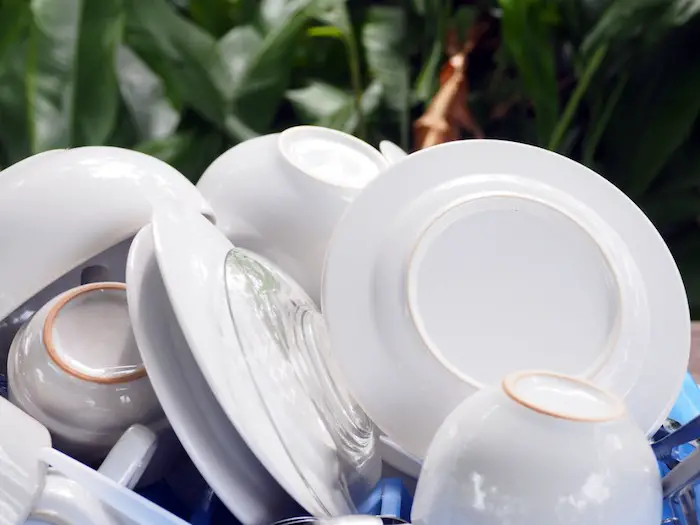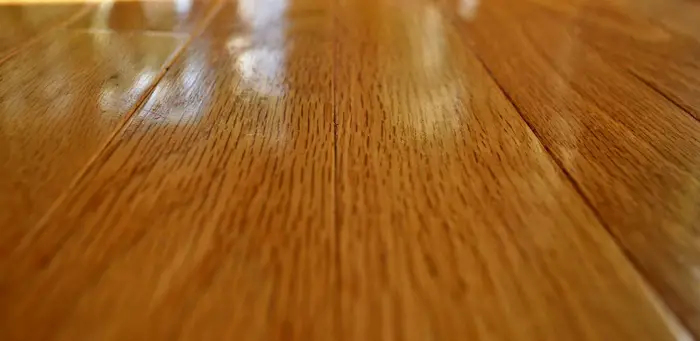You just spent a good time with your loved ones enjoying an incredible dinner. The kitchen sink is now full of dishes and that is when you notice that you do not have dish soap to attend to them. So what should you do? Do you pack the dishes until you have access to dish soap or just clean them with an alternative?
Can you use hand soap to wash dishes? The answer is no. To start, hand soaps have additives that make it very hard to rinse off. Part of these additives is antibacterial properties, which are toxic when consumed. As such, since traces of such content can be left on your dishes, it is not safe to use dishes that have been cleaned using hand soap. This therefore means that it is not safe to use hand soap to wash dishes.
There are other reasons why you should not use hand soap to wash dishes as discussed later in the article. Keep reading to learn more about why you should not use hand soap to wash dishes, how to wash dishes without dish soap, how to sanitize your dishes and other related questions.
Why you shouldn’t Use Hand Soap to Wash Dishes
As mentioned above, there are several reasons why you should not consider hand soap to clean your dishes. They include
- Hand Soaps are not Designed for Cleaning Dishes
Unlike dish soap, hand soap is not made to get rid of grease, oils and food remains stains. Its Ph. levels are different. This means that it will not work as efficiently even though it may look like its working. If you want to clean your dishes properly, invest in dish soap and avoid the frustrations of dishes with traces of grease.
- Waste of Water and Energy
Hand soaps are made from different ingredients as those of dish soaps. As such, it is very difficult to wash off the residue of hand soaps from dishes. You will require more water and even more energy to rinse off the slimy residue. This can be avoided by just sticking to dish soap or other workable alternatives.
- Health Risks
Now, should you leave traces of hand soap on your dishes, they tend to build up and end up in your food. The big question here is, what is in hand soaps? Is it safe to consume or are you risking a toxic build up in your system?
Hand soaps are made of toxic ingredients and additives such as triclosan and antibacterial properties. These chemicals have negative effects on your health. So should you fail to rinse your dishes properly, they may end up in your food and finally to your system. Although the toxins are mild, their harm, in the end, cannot be downplayed. You had rather be safe than sorry.
How to Wash Dishes without Dish Soap
Now that we have agreed that hand soap is not your best shot at cleaning dishes, what alternatives do you have? Well, there are several alternatives and most of them are homemade.
- Baking Soda
This is one of the most popular yet effective methods to wash dishes if you have run out of dish soap. It could be because it is a common pastry at home or even better, baking soda absorbs grease.
When using baking soda, first put on gloves to protect your skin. Mix half a cup of baking soda with a few tablespoons of water to make a paste. Apply the paste on a sponge and use the sponge to wash the dishes until you are satisfied they are clean. When rinsing, use the hottest water possible for disinfecting and leave the dishes to air dry.
- Vinegar
Vinegar just like baking soda is another popular homemade solution for cleaning dishes. Add about two tablespoons of vinegar in a cup of water. For the best result, the water should be warm. Use the scrub to wet it with the solution and use it to clean the dishes.
The above procedure is for handwashing. To use vinegar in a dishwasher follow the following procedure. Pour some vinegar into the rinse aid dispenser for use. Also, before starting the final cycle, pour about a cup of vinegar on the bottom of the dishwasher. This will also come in handy in cleaning the dishes and the parts of the dishwasher.
If you are using hard water, use half a cup of vinegar.
- Wood Wash
Wood ash is one of the traditional cleaners. It was used to wash hands and to clean dishes. It is effective when it comes to getting rid of the hard burning stains of food on dishes, pots, and pans. It is also best for cleaning metal utensils especially ash from leaves of a tree.
To use the wood wash, mix half a cup of it in few tablespoons of water to form a paste-like that of baking soda. Use the scrubbing sponge to apply the paste on the dishes and clean them.
In case you do not have wood ash readily available, you can burn papers, a small piece of wood or tree leaves.
- Lemon

Other than cleaning the dishes, another advantage of using lemon is that it kills bacteria. Moreover, it also helps to clean off burnt surfaces on your dishes. Therefore, if you are experiencing burnt stains, soak your dishes in lemon juice. After 30 minutes clean the dishes, you will find that it will be easier to get rid of the stains
To prepare the cleaning solution, follow the procedure: Squeeze some juice from the lemon. Mix 2 tablespoons of the lemon juice with 1 cup of water. Use the solution to clean your dishes.
- Citric Acid
Citric acid or lemon could be used interchangeably. When handwashing, add a tablespoon of citric acid granules to your water and use it to clean the dishes.
If you are using a dishwasher, add 1-2 tablespoons of citric acid granules and dissolve them in a cup of water. Add the solution to the soap dispenser and use it as you would use dishwasher soap
- Hot Water
Using hot water to clean your dishes is one of the easiest, cost-effective ways to clean your kitchenware. Moreover, hot water is effective in getting rid of a wide range of stains and dirt.
When using hot water, leave the dishes in the hot water for about 20 minutes. After the 20 minutes, use a sponge to scrub them.
Notice that when cleaning dishes that have been used for dairy products, they tend to produce a bad scent. So to get rid of this scent, when washing such dishes, soak them first in the hot water for 30 minutes, and then proceed to wash them. Also, remember to rinse them using hot water.
- Salt
Add two tablespoons of salt in 1 cup of water. Wet the cleaning scrub with the solution and use it to clean the dishes.
- Bleach
Ideally, bleach is used to sanitize your dishes, as we will discuss below. However, if you have run out of dish soap to wash your dishes, this can be your last resort
Pour about 4 liters of cold water in a bucket and add a tablespoon of chlorine bleach to the water. The water should be cold or at room temperature to avoid a chemical reaction. Tap water can be used in this case. Soak each dish into the water for about 10 minutes, and then wash them.
When you are done washing, rinse the dishes properly to get rid of any traces of chlorine bleach. Allow the dishes to stand and air dry completely.
How to Sanitize Dishes
For a long time, sanitizing dishes has been left to restaurants, hospitals and other public spaces that use dishes. However, this should not be the case, sanitizing your dishes is one of the paramount food safety measures. Sanitizing helps to kill germs and bacteria that you may have left out even after washing your dishes
If you are using a dishwasher, you can use the sanitizing option to sanitize your dishes. However, if you are hand washing your dishes there are several ways to sanitize them
Using Chlorine Bleach
Before we start, note that dishes can only be sanitized after they have been cleaned properly. This applies to all methods of sanitizing dishes.
Use one tablespoon of chlorine bleach per a gallon of water. The bleach should be unscented since the ones with scent are not recommended for items that handle food.
As said before, the water should be cold or at room temperature. Hot water stops the bleach from acting effectively.
When the solution is ready, soak the dishes in it for about two minutes, then remove them. Make sure you are wearing gloves when handling the dishes to protect your skin. In case your sink is made of stainless steel, avoid bringing it in direct contact with the bleach solution. You can do it by placing a plastic container to hold the water in the sink. This is because bleach tends to damage stainless steel.
- Hot Water
This second sanitizing method is best for metal dishes. Metal kitchen wears should not be sanitized using bleach since they may react and damage the dish example by darkening it.
If you are using a dishwasher, select the sanitize option for the last cycle once the dishes are clean. However, some dishwashers do not have a sanitizing option. If yours fall into this category, do not worry. The heat dry setting is hot enough to be used to sanitize your dishes. Alternatively, you can soak the dishes in the water in the dishwasher at 70 degrees Fahrenheit for at least 30 seconds. To be sure of the temperature, use a candy thermometer.
If you are hand washing your dishes, you can boil small metal dishes in hot water for about 10 minutes. For large metal dishes, boil them in water for several minutes. When handling these dishes put on gloves to avoid getting burnt. You can also allow the water to cool before recovering the dishes.
Related Questions
Can you use laundry detergent to wash dishes?
It is possible to use laundry detergent but it is not recommended. To start, laundry detergent contains brighteners, fragrances, anti-soiling agents, and stain removers that are meant to last long on fibers and synthetics. As such, these additives tend to adhere to the dishes making them hard to rinse off. This means that such additives may end up in your food causing a toxin build-up, therefore, causing harm to your health.
Another reason you should not use laundry detergent is that it may end up damaging your dishwasher. Also, in case the dishwasher is not designed for using laundry detergent you may lose your warranty.
Tragic! Also, due to the additives named above, when laundry detergent is used in a dishwasher, it may end up producing fumes that may be toxic when inhaled. If your health concerns are not reason enough not to use laundry detergent, I do not know what else is.
Can you use bar Soap to clean dishes?
Bar soap is another alternative to dish soap. That said thou, note that it does not clean dishes as effectively as dish soap does. It should therefore not be a priority.
First, bar soap is not designed to get rid of grease and kill bacteria, unlike dish soap. Second, bar sop is solid making it very hard to use, unlike dish soap that is mostly in the liquid from.
Can I mix bleach with dish soap when sanitizing?
First, this dangerous procedure may lead to a hazardous chemical reaction. Most dish soaps contain ammonia content. When ammonia and bleach come together, they produce toxic bad gases that may cause you to choke and sometimes even die. Moreover, soap stops the bleaching property of bleach, therefore standing in the way of it being effective, the more reasons why you should not use it.
Related Article:
Can You Use Hand Soap To Wash Your Body
Can You Wash Dishes With Wedding Ring? (Explained)
Can I Use Dishwasher Detergent To Hand Wash Dishes
Can You Wash Dishes In Cold Water?


